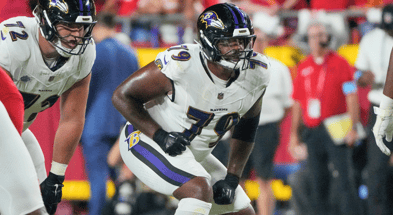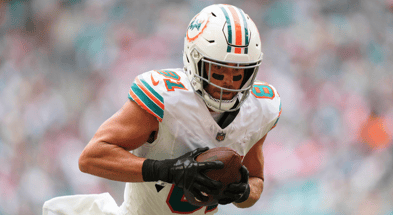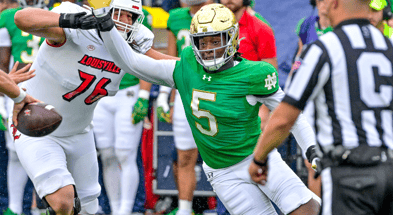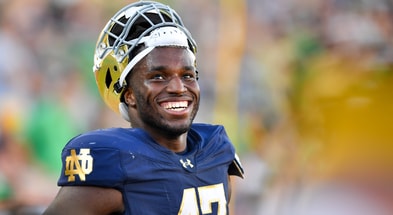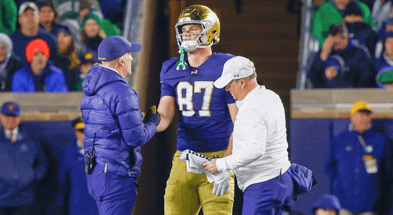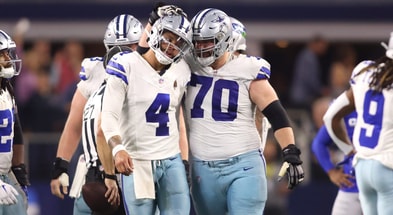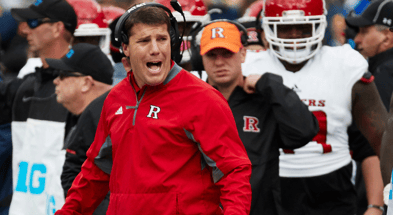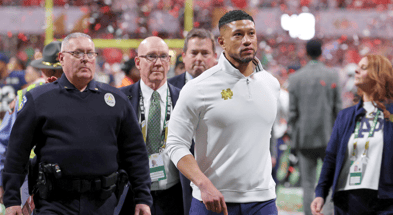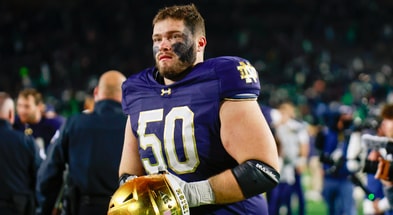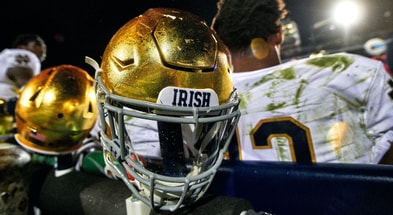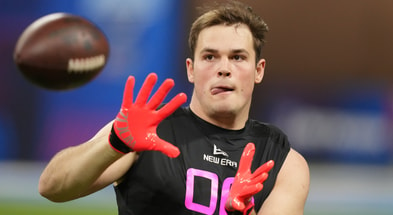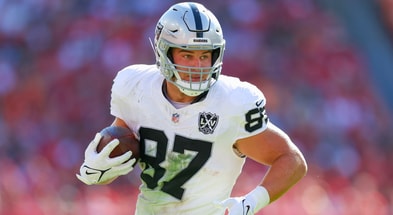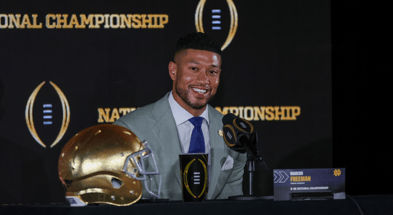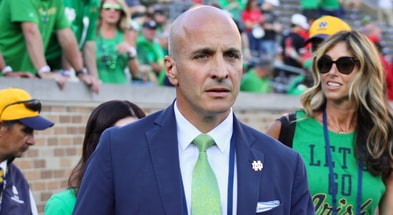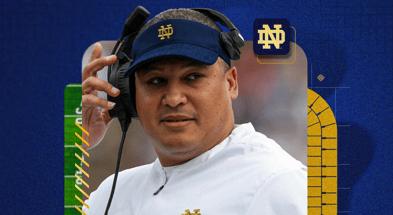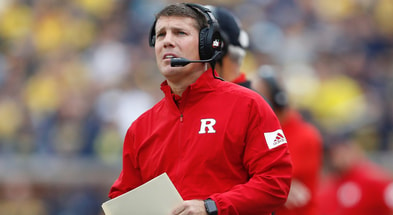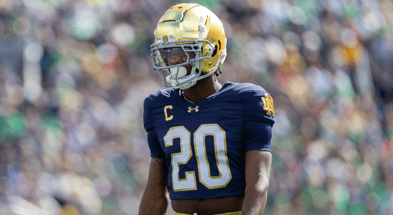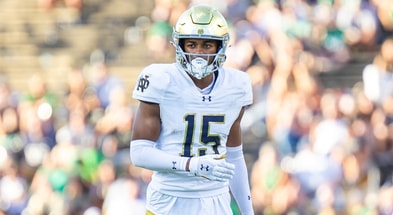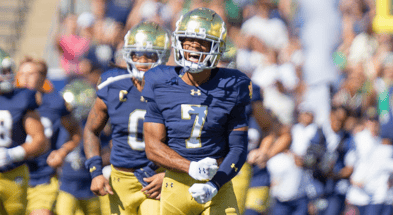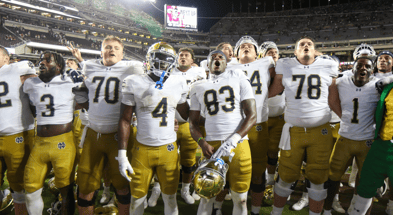What Notre Dame head coach Marcus Freeman said on Jim Tressel’s podcast
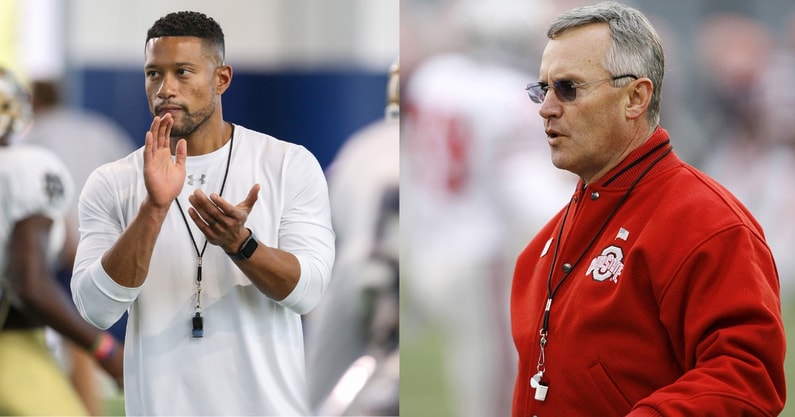
One of Notre Dame head coach Marcus Freeman’s most important mentors is his college head coach, Jim Tressel. The two caught up Tuesday on Tressel’s podcast.
After coaching at Ohio State for 10 years and serving as the president at Youngstown State for 10 more, Tressel now hosts a podcast called “It’s All About the Team.” Tressel had Freeman on to talk about Freeman’s playing career, how he got into coaching and the trials and tribulations he went through during his first two years as the head coach at Notre Dame.
Here are five things Freeman said on Tressel’s podcast. Full video:
On his brief NFL career ending due to an enlarged heart valve
“During that physical, [with the Indianapolis Colts] they find an enlarged heart valve. They sent me through all these tests and they finally come after hours and say, ‘We’re not gonna sign you. Nobody in the NFL is gonna sign you with an enlarged heart valve. This is probably it.’ I remember driving back from Indianapolis on I-70 to Columbus, and I just remember laughing, saying, ‘This is God just saying, ‘Enough’s enough. Get into coaching. What are you doing?’ And I remember you and Coach [Luke] Fickell saying, ‘Okay. See you at 6 a.m. the next day.’
“I always tell the story that I got into coaching because I wanted to be around football. I’m in Houston with the Texans and I’m not playing, but I love the game of football. Very quickly did I learn coaching football wasn’t it; it was seeing others have success, being a part of seeing other people have success. I learned that my first year as a GA, seeing a guy named Nathan Williams — I gave him a tip sheet, he goes and makes a sack and he comes over and hugs you. I’m like, ‘That’s what it is. This is coaching. This is what serving is.’
“I don’t know where my future would have gone if I would’ve signed with the Colts. But God has his hand in all this, and he said, ‘Turn around on 70. Head back.’ And here we are, however many years later.”
On what he learned as the defensive coordinator at Cincinnati
“We struggled Year 1. I think we won three games, maybe, or four games.”
Tressel: “Teams are not built overnight. Remember that, viewers. Relationships and growing together, it doesn’t happen fast.”
“It doesn’t. You learn so much from those losses and those challenges you face, especially early in your career. We were challenged that year. I’ll never forget, I think we’re 100th in the country on defense. We said, ‘Oh man, we gotta fix some things.’ And that’s what we did. I remember [Fickell] having a meeting with the seniors the previous year, the first year, and he came back to us as a staff and said, ‘This team, this group of seniors, weren’t as close as I thought they were.’ And he said, ‘We gotta become a closer team.’ So we were intentional about being closer, and doing things that make us closer, because there has to be that selflessness that these [teammates] are our family. This is family, because you have to put that person in front of yourself.
“We got things turned around and we won 10 games, I think, the following year, and now the confidence and belief is there. And we got it rolling. Won 11 games the next year, and then we win the AAC Championship the fourth year, and we barely lose to Georgia [in the Peach Bowl]. But again, to see what Coach Fickell did with that program from where it started to when I left in 2020, where it had gotten to, was tremendous. And he did an unbelievable job of getting the program to that point.”
On what he did differently from Year 1 entering Year 2 at Notre Dame
“We had to be intentional in having team-building events, no matter if that’s in the weight room, no matter if that’s outside the football facility. We had to continue to get guys to spend time together, and we were strategic about that, especially now that we were adding a couple transfers. And again, I think you’ve said this, too, that one of the greatest strengths we have at Notre Dame is the love for Notre Dame. And it’s difficult, when a guy transfers in, to get him to understand and to have a love for Notre Dame. We have to get that to happen, so you have to be very intentional and strategic about trying to formulate that togetherness. And that’s what we did.”
On how he dealt with Notre Dame’s three losses in 2023
“We had a talented team. We had a really good team, and still, you lose some tough games. We start off 4-0, we lose a tough one to Ohio State, and then you lose one to Louisville, right, that you felt like you shouldn’t have lost. And then we lost a late one to Clemson, and we finished off the year 10-3.
“I remember partly through that year, that season — I can’t remember what game it was at, maybe after the Louisville game — and I’m talking to you, and you said something about, ‘Hey, see what your players are thinking.’ I met with the captains and said, ‘I want your opinion. What can we do better as coaches? Here’s the things that we, as coaches, said that our players have to do better. I want your feedback.’ Because if we create a culture and an environment that promotes honesty — which I hope I do — when I meet with these captains, you have to be strong enough to hear what they have to say. ‘Coach, this is what we see. Maybe we lean to much on we’re Notre Dame and we’re gonna be better, no, Coach, we gotta make sure that we prepare and do the things that it takes to be Notre Dame.'”
Top 10
- 1New
Women's AP Poll
New No. 1 in Top 25 shakeup
- 2
Top 25 shakeup
Baseball poll sees big movement
- 3
Steph Curry
Accepts GM role at alma mater
- 4
Portal Problems
Dan Hurley airs it out
- 5
Cooper Flagg mom
Calls out UNC fans
Get the On3 Top 10 to your inbox every morning
By clicking "Subscribe to Newsletter", I agree to On3's Privacy Notice, Terms, and use of my personal information described therein.
“I was like, ‘Oh, this is great.’ I remember writing all this down and having a meeting with our staff and saying, ‘I just want you to know what our players are saying.'”
Tressel: “And it’s humbling for them.”
“Amen. That moment made us better. That conversation made us better. And I was intentional about taking some of their feedback and saying, ‘Okay, we’re going to implement this in a practice and in intentional actions.’ That’s it; it’s continual growth. There is no finish line.”
On how he approaches team building in the NIL and transfer portal world
“My discussions with our staff have been, ‘We have to double down on relationships.’ We have to know what our guys are thinking.’ And that takes time. And we gotta spend time with their families. We gotta get on the phone with their parents, because we all have to be speaking the same language to the young person who has so much noise going on in his head. And that’s important for us to do, so there are no surprises. If a guy decides to leave, go into the portal, we know this is gonna happen, right? Here’s the reasons why. This is what he thinks, his family thinks and you know what, let’s move forward.
Tressel: “And sometimes, it’s okay.”
“It is. It’s what’s best for him. But it’s so important to have relationships with your players and never assume everything is good, because it’s not. Somebody’s having a relationship with him. If it’s not you, somebody is. Somebody’s in his ear. And that’s so important.
“I think the other thing is to continue to show them the examples of what delayed gratification really is, and that’s something I try do in our meetings. We had a young man named Xavier Watts that won the Bronko Nagurski Award this year. And he came into Notre Dame as a wide receiver, right, and he redshirted his first year. Halfway through his second year — this was my first year as the defensive coordinator — Coach [Brian] Kelly moves him from wide receiver. He says, ‘Hey, try him at safety. He played safety in high school. See what he can do.’ He played a little bit, but he showed some flashes. His third year, he started, rotated a little bit, but he really was now positioned to be the guy at safety.
“In his fourth year, his really first year of truly starting, he goes out, has a whole bunch of interceptions, great player, wins the Bronko Nagurski Award. I tell the freshmen all the time, ‘Some of you guys are transferring after this first year because you’re not playing.’ And so, understand that delayed gratification. It’s what the majority of you have to do.”

